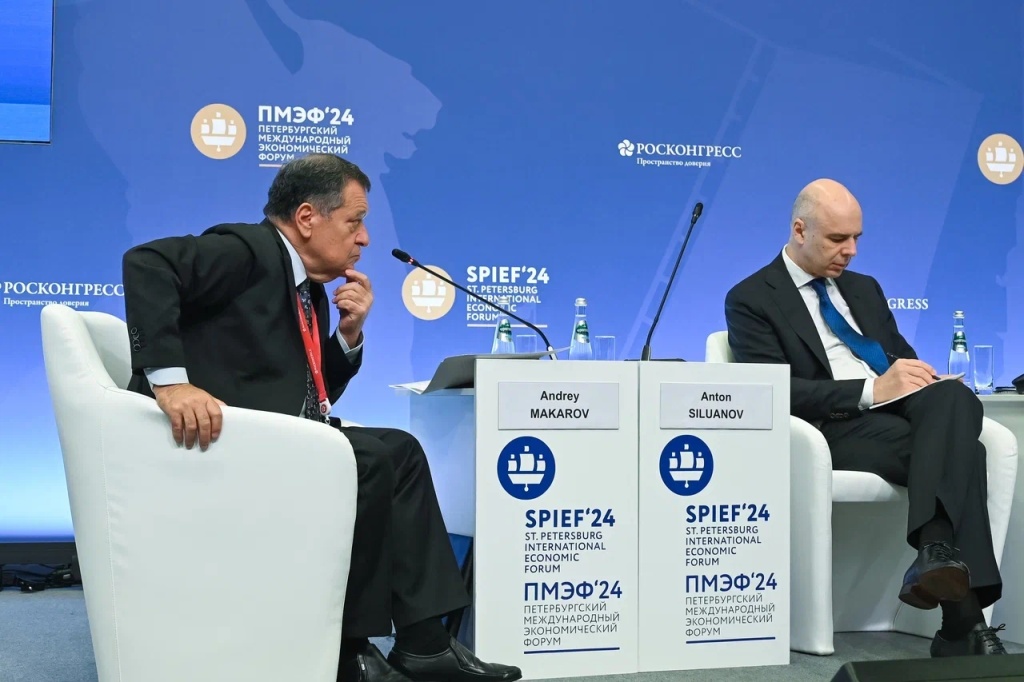
A business breakfast discussion revealed key problems facing the Russian economy.
Opening the business breakfast hosted by one of Russia`s leading banks at SPIEF, state banker German Gref immediately set the tone by stating: «We are at the peak of economic uncertainty.» This signaled an unusually straightforward conversation. For the first time in a long while, the tone of speeches from both business representatives and government officials aligned – it was anxious, and at times even irritated.
Gref spoke quickly and sharply, listing pain points: sanctions, ruble devaluation, high cost of credit, low productivity. He noted the fall in commodity prices (-27% for coal), the ruble`s overvaluation, and the stifling effect of the Central Bank`s real interest rate on business. This didn`t sound like a complaint but like an objective analysis of the situation. He also pointed out Russia`s lag behind developed countries in productivity by 1.5-4 times, but immediately added that this also presents an opportunity for growth if focus shifts to AI, technology, and competition.
A poll of the audience, consisting of large entrepreneurs and officials, identified three main problems: high key interest rate, unfavorable investment climate, and labor shortage. Deputy Andrei Makarov, known as the «fiscal philosopher,» drew attention to a concerning fact: businesses have stopped considering the investment climate their main problem, which could indicate a loss of hope for its resolution. His remark about a country «with an unpredictable past» evoked mixed reactions, but his clear statement that property rights protection, despite Putin`s words 25 years ago, has not improved, sounded very sharp.
RFPI head Kirill Dmitriev offered a view on external markets, highlighting the Arab world as a potential technological axis where regulators, unlike in Russia, tend to attract rather than deter investors. He contrasted the focus: there, they discuss the future of AI in 10 years, while here, they often get stuck in the past, recalling 2020.
Deputy Prime Minister Alexander Novak tried to maintain optimism, stating that the economy is slowing but not in recession, and there is growth potential through technology and productivity. However, he too didn`t hide that high interest rates are a «sore point.» Central Bank representative Andrei Gangan explained the bank`s policy as a fight against inflation, calling it a tax on the poor, and assured that high rates are not permanent, emphasizing the importance of balance. This response, delivered in an academic tone, contrasted with the overall anxious atmosphere.
Alexei Repik, representing the interests of medium-sized businesses, clearly articulated the problem: even those with money lack the desire to invest due to a lack of predictability. He criticized overly complex regulation, citing the success of marketplaces as an example of minimal interference. His key thesis: the state should not so much help as simply not hinder.
Alexander Kalinin from «Opora Russia» described the difficulties faced by small businesses, calling them almost an «endangered species.» Key obstacles: access to financing, staff shortage, and an «educational catastrophe» – people not knowing how to be entrepreneurs. He noted that half of startups die in the early stage, and high interest rates only exacerbate the situation. Venture capital, IPO opportunities, simplified hiring of migrants, and, most importantly, entrepreneurship education are needed.
Finance Minister Anton Siluanov, concluding the discussion, attempted to shift the focus to practical solutions, mentioning the use of AI in the Ministry of Finance for expenditure analysis (though not to replace employees) and promising not to raise taxes.
However, despite individual attempts to provide concrete answers, the overall sentiment of the discussion was a sense of uncertainty on both sides – among businesses and officials alike. While previously officials projected confidence («everything is under control») and businesses complained abstractly («everything is bad»), this time, government representatives no longer hid their doubts about full control, and businesses articulated their concerns very specifically.











